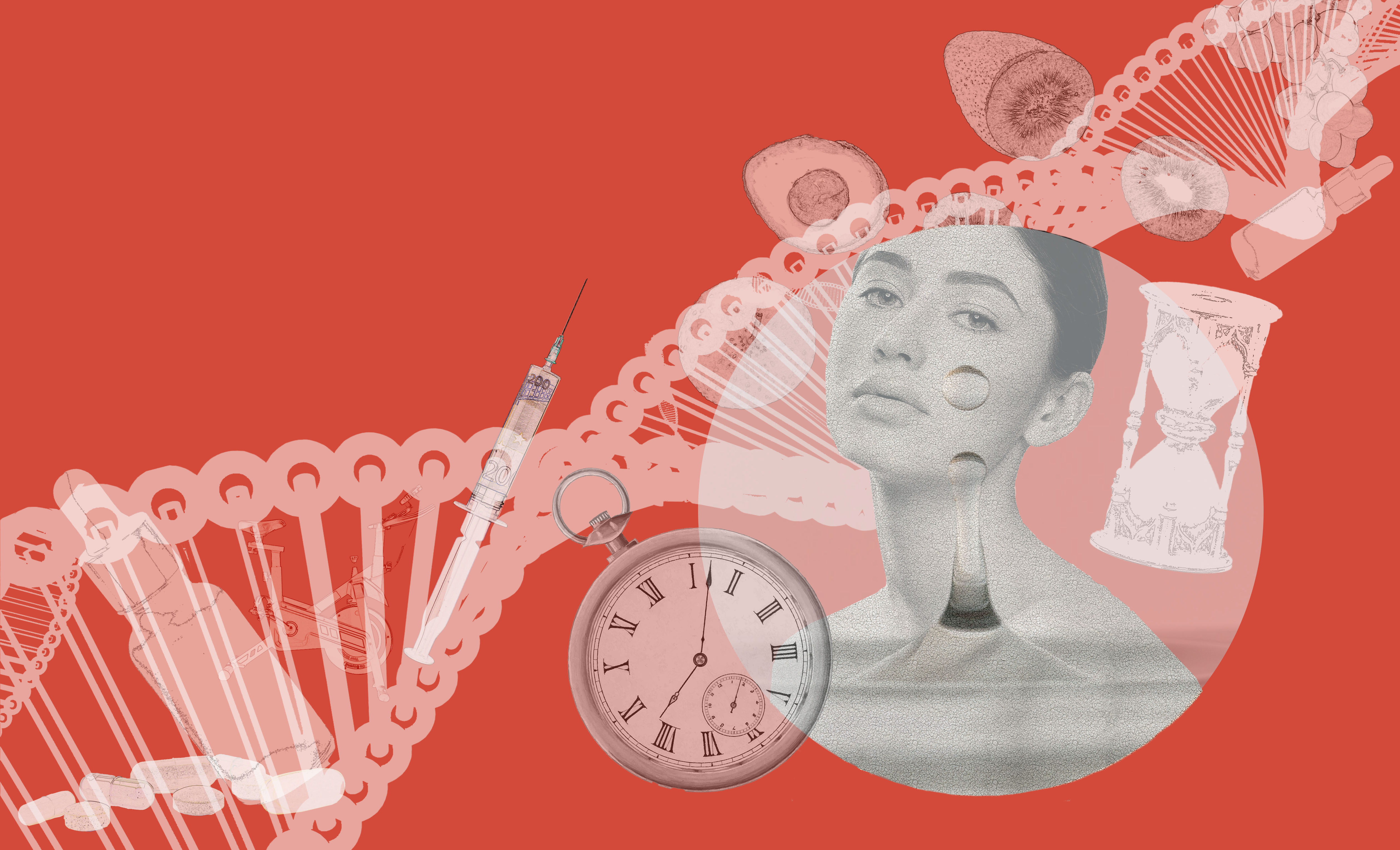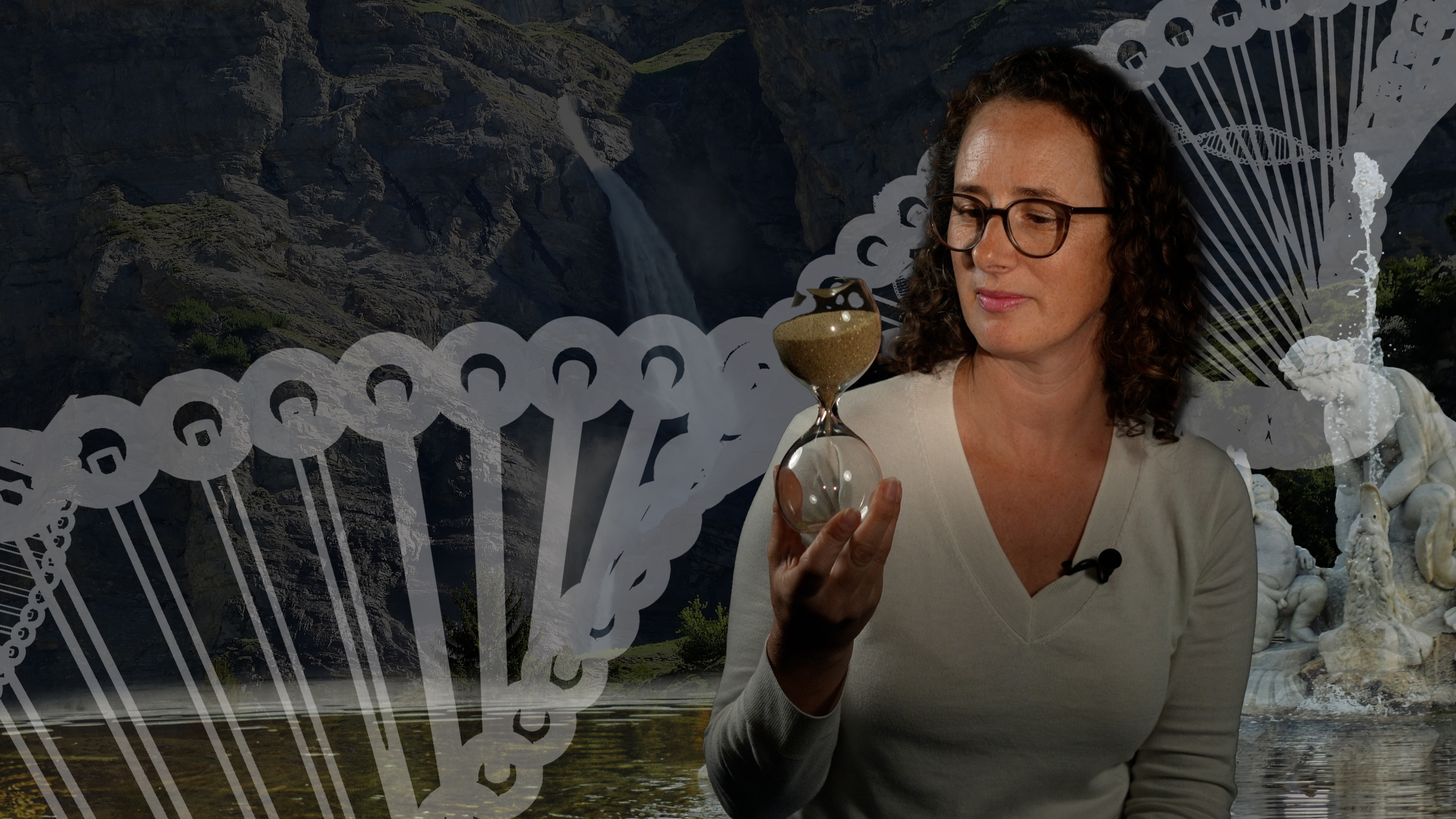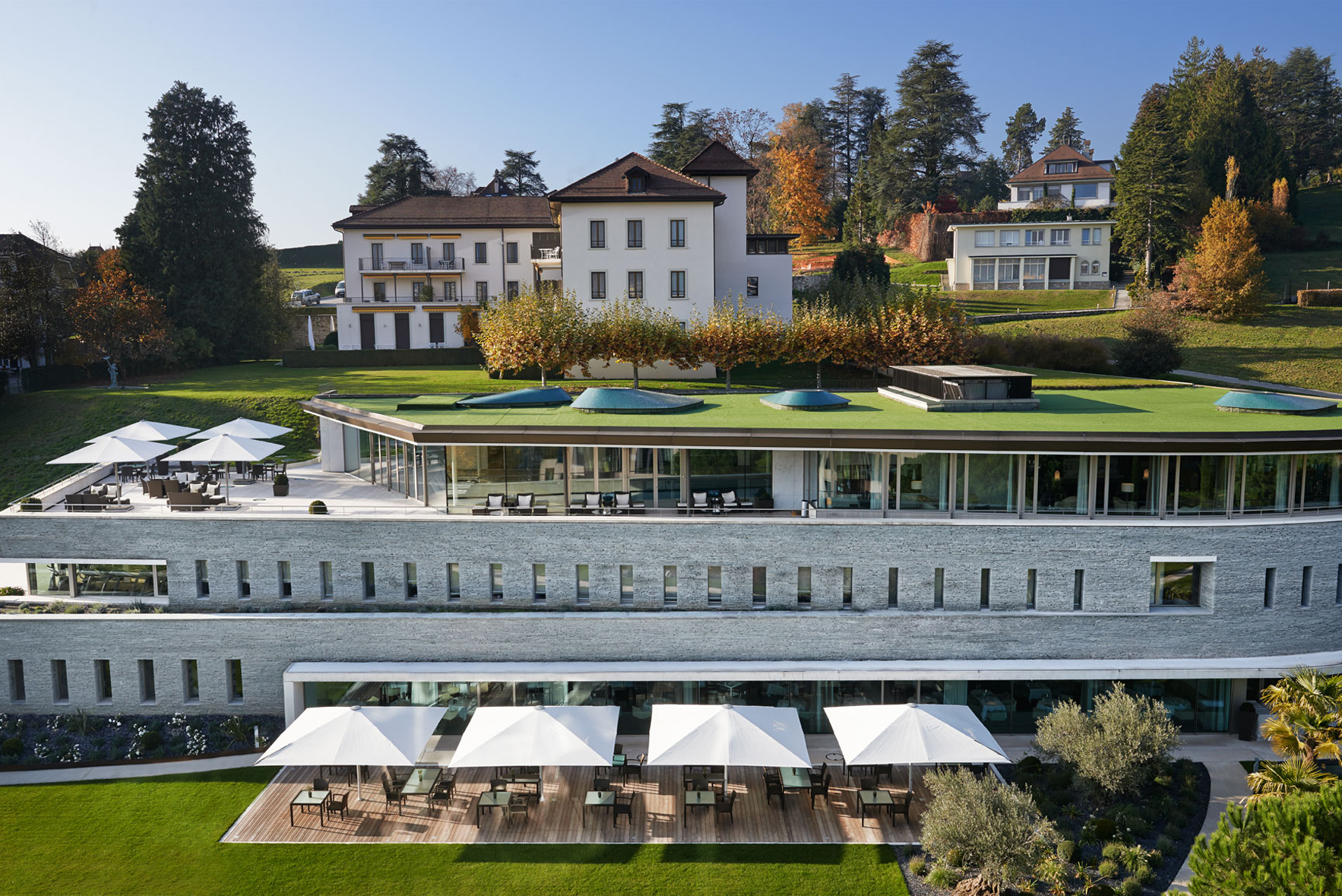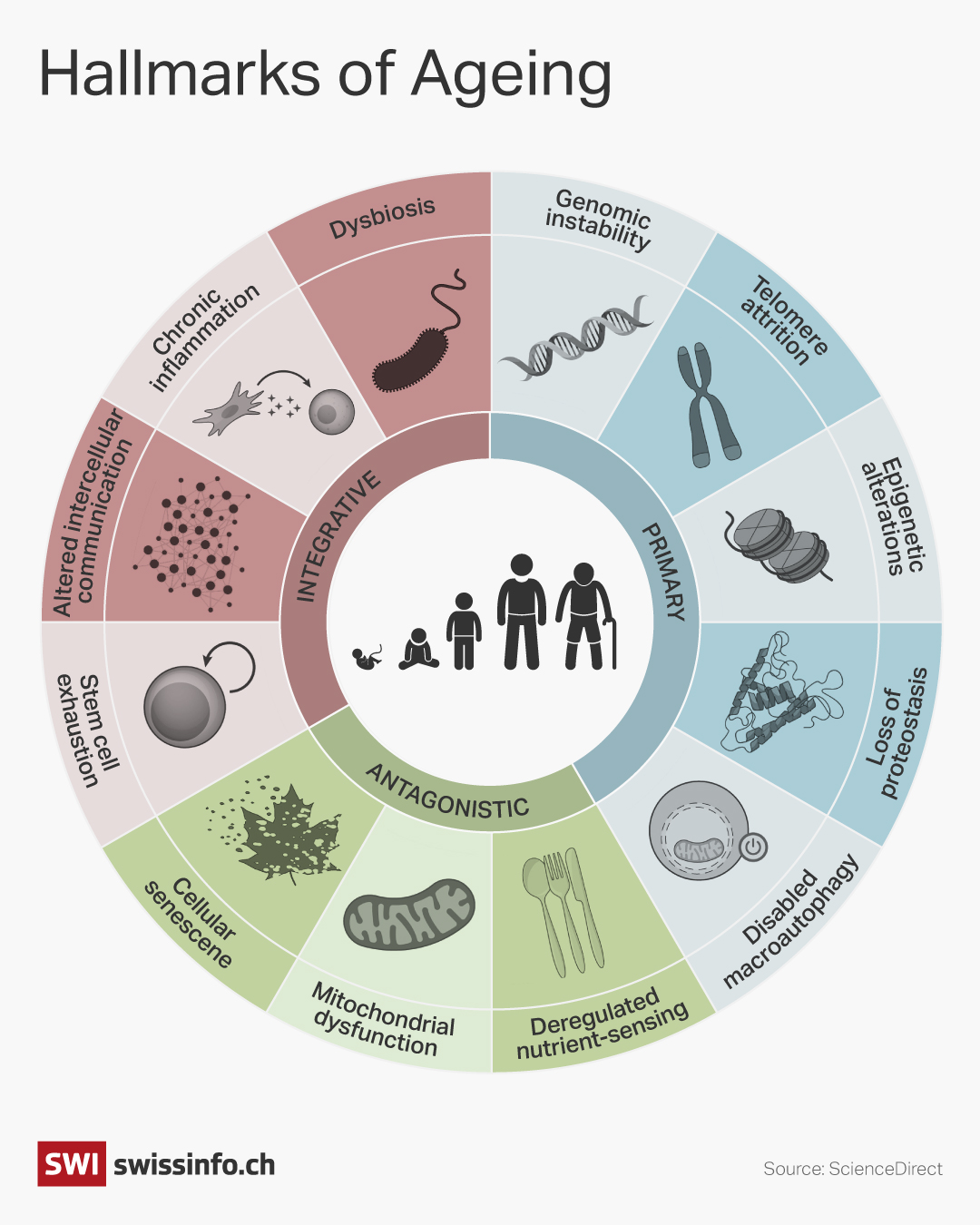
Longevity clinics: modern-day snake oil or the key to healthy ageing?

The search for the elixir of life has been going on since time immemorial – and Switzerland has played a key role. Although scientists have yet to come up with a winning formula, the Alpine nation has a booming market for treatments, pills and gadgets that claim to slow ageing and help us live healthier, longer lives.
As a woman in my mid-40s, I’m increasingly conscious of the shadow of Father Time. I can see and feel the signs of ageing – the grey hairs, the wrinkles around my eyes, and the muscle aches when I wake up. Four years ago, I had my ovaries removed because I was found to have a high genetic risk of cancer. This plunged me into menopause. Within six months, I felt I had aged 20 years.
I found myself asking – does it have to be this way? Why do some of us turn grey in our 40s while others only do so in their 60s? Why are some middle-aged people struck down with heart disease or cancer while even members of the same family never suffer? Why do some seniors struggle to walk while others still run marathons? If we all age differently, shouldn’t we be able to slow the ageing process and avoid its deleterious effects?
People have been searching for the secrets to longevity for centuries. Huge advances in the science of ageing and technology such as AI in the last decade have given scientists reason to believe we are on the cusp of a major breakthrough. This has fuelled a new longevity movement with clinics and companies popping up in many parts of the world such as Saudi Arabia, the US and Switzerland, offering sophisticated tests, novel therapies, and a world of promises.
Switzerland has been a key player in the pursuit of eternal youth dating back centuries when people came from across the globe to experience the healing powers of its thermal baths. Swiss wellness clinics, scientists, investors and pharmaceutical companies have all advanced the longevity field. But how much is the latest longevity trend just hype and good marketing? Can we really extend our lifespan and why do we want to?
This article is part of a series investigating the growing longevity trend and Switzerland’s role in it. You can find all the articles and videos in the series at the bottom of this article.
My search for answers to these existential questions took me on a global quest. I attended a conference on ageing and drug discovery in Copenhagen and a global forum on improving health and longevity in St Moritz; I spoke to longevity experts in Singapore, the US, China, Saudi Arabia, and Switzerland; and I visited three longevity clinics that included an entire day at the legendary Clinique La Prairie on the shores of Lake Geneva.
Along the way, I learned about advances in technology, scientific breakthroughs, and artificial intelligence over the past two decades that have transformed our understanding of ageing, generating hope that we can live longer, healthier lives, slow the ageing process, and possibly one day even turn back time.
Around the world, clinics and wellness spas are booming, capitalising on this new knowledge to offer a smorgasbord of longevity treatments such as redlight therapy, blood plasma exchange, and stem cell treatments.
Switzerland is at the forefront, building on its reputation as a top destination for those in search of health and longevity. For more than a century, this tiny Alpine nation has offered an unrivalled combination of spectacular mountain scenery, thermal waters, a top-notch healthcare and medical system, pioneering technologies, and a reputation for luxury hospitality – not to mention discretion.
Find out more about Switzerland’s history as a longevity destination:

More
How Switzerland became a longevity hot spot
As I live and work in Switzerland, I decided to take advantage of what’s on my doorstep. So, on a crisp, foggy day in January, I stepped through the sliding doors into the foyer of Clinique La Prairie to find out what it had to offer.
Despite the serene and calming environment, I was gripped by anxiety over what my visit would reveal. Would I learn that my body is years older than my chronological age – a sign of premature ageing – that I have undiagnosed heart disease, thyroid cancer, or a high risk of developing Alzheimer’s? Or would I be pleasantly surprised to discover how much healthier I was than I had feared?
View from the inside
Clinique La Prairie opened in 1931 as a medical spa catering to the rich and famous, offering “pioneering science, rejuvenation and vitality” based on discoveries in cellular therapy by its founder, Swiss doctor Paul Niehans. Well-known celebrities including actress Marlene Dietrich and wartime politician Winston Churchill are said to have sought out Niehans’ controversial “youth cures”.
Today, the clinic says it aims to “empower one to achieve a longer, healthier and more vibrant life” with the help of science and innovative medical solutions and treatments. This is made possible with the help of 50 doctors and other medical professionals located in a medical centre on the premises.
Its signature programme is the week-long Revitalisation Premium which, for CHF48,250 ($54,606), including meals and accommodation) promises to “unlock the secrets of longevity and wellbeing.” The package also includes their secret CLP Extract “rejuvenation formula” inspired by Niehans’ original work with lamb stem cells, which is only available to guests as an oral supplement at their Montreux location.

With a much smaller budget, I could only manage an eight-hour visit. But I was told I could still meet with experts, test out some of the latest longevity diagnostic tools, and probe the science behind the marketing brochures.
I spent an hour with health science specialist Giorgia Grisotto, who did a series of tests to provide me with a nutrition score. To get a picture of my metabolic health, she wrapped me in plastic with a clear dome over my head attached to an oxygen tube for a calorimetry test that captures how many calories I need when I’m in a resting position.
I had a session with movement trainer Matteo Falzone to find out how my reaction speed and perception span rate against the average for my age. I then had an hour in an infrared detox dome, where I apparently slept for 20 minutes and came out feeling like jello – in a good way.
It’s not hard to imagine that after a week at the clinic, I’d feel younger, and maybe after one of their stem cell rejuvenation facialsExternal link, which I didn’t have, I’d even look younger. But would my body actually be younger?
According to the Cambridge Dictionary, longevity is defined as “living for a long time”. The term is increasingly used to refer to lifespan (total years lived) and health span (years lived in good health, free from chronic disease and disability).
Research breakthroughs
Possibly. A series of scientific and technological breakthroughs starting in the 1990s allowed researchers to gain deeper insights into why we age and gave us the tools to measure, for the first time, the ageing process.
The established wisdom at the time was that genes were responsible for 80% of our lifespan, but new studiesExternal link revealed that in fact they are only responsible for 10-30%. Equally, if not more, important to determining how rapidly our bodies age are our environment and lifestyle.
This area of research, known as epigenetics, looks at how our genes are expressed or turned on and off by factors such as our exposure to toxins, the amount we exercise and sleep, and the food we eat.
Epigenetics enabled scientists to come up with the first biological age clock in 2013 that measured how old a person’s cells are as opposed to their chronological age.
There are a range of different biological age clocks that analyze specific molecular markers that change in predictable ways as we age. The first one was developed by US-German scientist Steve Horvath in 2013.
Blood, saliva, or tissue samples are used to analyse DNA methylation, a biochemical process that helps regulate our cardiovascular, neurological, and reproductive systems and tells the body when and whether to turn genes on or off. DNA methylation decreases as we age, which means the switches increasingly do not turn on and off as they should, and this can trigger inflammation and disease.
Studies have shown that a person’s biological age as measured by the clock can go up or down in a matter of a few months after an illness (such as CovidExternal link or cancerExternal link) or lifestyle changes such as reducing alcohol intake, increasing high-intensity exercise, and following a calorie-restricted diet.
There are now a range of biological age clocks using different methods, biomarkers and algorithms.
The same year, researchers published a major paperExternal link in Cell magazine introducing nine hallmarks of ageing (a number later expanded to 12, including chronic inflammation). These aren’t visual signs of ageing, like grey hair, but changes that take place at the cellular level as we age.
“The fact that we now know that epigenetics, driven by lifestyle, can influence the way we age as opposed to relying on genetics, has increased people’s awareness that they can actually do something about how they age,” said Simone Gibertoni, the CEO of Clinique La Prairie and the driving force behind its longevity programmes.

These developments coincided with major advances in artificial intelligence and machine learning, digital technologies, and medicine including genomics. This has made it possible to measure everyday behaviour, such as sleep, and hundreds of biomarkers or risks for diseases.
“Suddenly artificial intelligence made it all seem possible to control ageing, something that a lot of people had long regarded as uncontrollable,” said Christina Röcke, a German psychologist who is the managing director of the Healthy Longevity Center at the University of Zurich. “On top of this, wearables and personal tracking devices made people more aware of their behaviour and feedback more accessible.”
Momentum grew with the rise of social media, which created a community of longevity enthusiasts like US entrepreneur Bryan Johnson, who experiment on themselves and share health tips beyond the confines of traditional medical practice.
Big business
These scientific advancements and the wave of new treatments that followed have turned longevity into a money-spinner. Analysts predictExternal link the global market for longevity therapies will almost double, to $44.2 billion in 2030, from $25.1 billion in 2020. Billions of dollars have been poured into longevity start-ups and clinics, supplement companies and device makers in the last decade.
Private clinics and health centres are popping up all over the world, catering to relatively healthy and wealthy middle-aged people looking to ward off ageing. There are an estimated 800External link longevity clinics in the US. Dozens have opened in the Gulf region in the last few years, and 2023 saw the first private longevity clinicExternal link open in China. Clinique La Prairie has six hubs and resorts in Europe, Asia and the Gulf region, and aims to open at least 40 more in the next decade.
More
In Switzerland, I counted just over 20 private clinics offering longevity tests and treatments. At the high-end is Küsnacht Practice, a luxury treatment centre for people with addiction and psychiatric disorders. A one-week stay at a fully staffed villa starts at CHF117,300, including all medical tests and treatments in its longevity programme called BIO-R Restoration.
For those with more limited resources, the day clinic Ayun, a few blocks from the Zurich train station, offers a comprehensive diagnostic check for around CHF3,000 and an à la carte menu of treatments and services starting at CHF55. At the Longevity Center, a private clinic which recently opened in Zurich, a longevity check-up starts at CHF1,850. Its “supreme” check-up, which includes around 30 different tests such as biological age and a 3D body scan, costs CHF14,500.
Risks and benefits
But just as with previous health crazes like low-fat and cholesterol-busting diets, and colonic irrigation, which science subsequently proved were misguided, some researchers and scientists are already calling for the benefits of longevity treatments to be treated with caution.
Studies have shown that many of the most frequently found treatments at clinics, such as cryotherapy, red light therapy, vitamin infusions, and hyperbaric oxygen, can improve health or specific biomarkers, for example in athletes. But most fail to show the benefits last or that they help people live longer.
And while some treatments, such as taking the immuno-suppressant drug rapamycinExternal link, intermittent fasting, and exposure to freezing cold temperaturesExternal link, extend the lifespan of worms and mice, there is very little evidence, if any, of their ability to do the same in humans.
“There’s a lot of hype around longevity and there is definitely a lot of exciting research going on,” said Christoph Handschin, a cell biologist at the Basel BioZentrum who wrote a paperExternal link on separating fact and fiction in the longevity field. “What is often under-appreciated, though, is the things we already know that minimise risks of age-related diseases. Where we have good evidence in humans is for things like exercise that might appear pedestrian.”
As competition intensifies, many clinics are offering a widening array of novel, and in some cases experimental, treatments such as gene therapy or blood plasma exchange to attract clients (although I didn’t come across these in my research in Switzerland).
“I think some things are commercialised in a premature manner because there’s money to be made,” said Handschin.
Despite the mixed evidence, visitors to longevity clinics are willing to give treatments a try in the hope that they will open the door to better health, even if there is no guarantee of living longer.
Jochen Hurlebaus, a 53-year-old German citizen who works in the healthcare industry near Zurich, paid CHF5,000 for a 12-month programme that includes longevity check-ups, doctor consultations, and a series of treatments at Ayun last summer. “I think I’m in good shape, but you never know until you do the tests,” he told SWI swissinfo.ch. “I wanted to know what I can do to stay healthy in the next 20, 30 years.”
Hurlebaus said it was worth spending the money even if many of the recommendations were lifestyle changes he can make at home. “I know not everybody can afford to go to a longevity clinic, but they should seriously think about it, and with technological progress it will become more affordable,” said Hurlebaus. “How much do you spend repairing your car? Why don‘t we treat our health this way?”
What your grandmother told you
It remains to be seen if humans can extend their lifespan much further than the huge leaps made over the course of the 20th century. A studyExternal link published in Nature magazine’s Nature Aging journal last October suggested that we’ve already reached peak lifespan.
“Slowing ageing is possible, and not as hard as we, scientists, originally thought,” said Brian Kennedy, a US-trained ageing scientist who used to run the Buck Institute for Research on Ageing in California and now works at the National University of Singapore. “If you really want to talk about stopping or reversing ageing, then that’s another discussion. And I don’t think anybody knows whether that’s even possible right now.”
Check out the latest episodes of our science podcast talking about the hottest pharma and healthcare topics:
Subscribe to
-
Apple PodcastsExternal link
-
SpotifyExternal link
-
Amazon MusicExternal link
-
Podcast IndexExternal link
-
OvercastExternal link
-
YouTubeExternal link
-
iHeartRadioExternal link
-
PandoraExternal link
-
Podcast AddictExternal link
-
CastroExternal link
-
CastboxExternal link
-
PodchaserExternal link
-
Pocket CastsExternal link
-
DeezerExternal link
-
Listen NotesExternal link
-
Player FMExternal link
-
GoodpodsExternal link
-
True FansExternal link
- Buzzsprout RSS Feed External link
The clinics contacted by SWI choose their words carefully when talking about longevity. “First we need to focus on living better, meaning extending the time that we are healthy. Our lifespan, meaning how many years we live, comes after,” said Gibertoni from Clinique La Prairie. “We don’t have the magic pill that can prove over any doubt that we can live longer. Until then we need a holistic approach to ageing.”
Longevity clinics see themselves as filling a gap in the healthcare system, which is focused on treating rather than preventing illness. “People want to maintain their health physically, mentally, and emotionally for as long as possible because quality of life means remaining full of vitality – physically fit, mentally alert, free of pain and chronic illness – until the end,” said Antoinette Sarasin Gianduzzo, who created the BIO-R programme at Küsnacht Practice.
It’s hard to argue with this when I think about how I’d like to live the rest of my time on earth. I decided not to test my biological age – I don’t have a burning desire to know, and I don’t think it would motivate me to take greater care of my health. But my short visit to Clinique La Prairie did reveal some problem areas, specifically when it comes to metabolic health and sleep, which is due in large part to the number of hours I spend sitting and my love of cheese.
This knowledge has prompted me to make small lifestyle changes. I take my sleep more seriously, do more strength training, eat more protein and take a few vitamin supplements.
But do I really need to go to a longevity clinic? Many of the recommendations I’ve been given about staying healthy and living longer I already know but struggle to put into practice as I juggle a job with raising two children. There’s also the question of balancing time and money. I’m sure a one-hour session in a cold chamber would help me sleep better, but is that a good use of my time and CHF100, with little guarantee the benefits will last?
“There is solid evidence from different fields on what actually helps improve health, well-being, and quality of life into old age,” said Röcke. “I’m sorry to say, but a lot of these are what your grandmother already told you and that doesn’t need to be bought in expensive longevity clinics.”
Edited by Nerys Avery/vm/gw
SWI swissinfo.ch paid CHF250 for the VitalDome treatment. Other expenses including the nutrition and mobility diagnostics tests were covered by Clinique La Prairie.
Note: Following publication of this article, SWI added mention of an additional longevity clinic in Zurich to give a more comprehensive view of the range of prices and services offered by clinics.

In compliance with the JTI standards
More: SWI swissinfo.ch certified by the Journalism Trust Initiative


































You can find an overview of ongoing debates with our journalists here . Please join us!
If you want to start a conversation about a topic raised in this article or want to report factual errors, email us at english@swissinfo.ch.